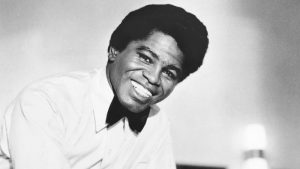
James Brown was born into extreme poverty in South Carolina in 1933. From an early age, Brown was surrounded by music in informal settings and learned to play the harmonica, drums, guitar, and the piano. Brown’s musical styling is difficult to define as a genre because of its association with black, Southern culture and because incorporates elements of gospel and blues. Commonly referred to as “Soul Music”, Brown’s style represented the love and freedom that the African American Community found in music.
Brown’s soul music, or race music, as it was once called, combines styles of blues, jazz, and rhythm and blues, which The Grove Dictionary of American Music writes once influenced artists to later develop the funk genre. In blues music, the harmony is often influenced by church music and vocal embellishments, such as bending pitches, moans, shouts, and vocalizations are drawn from gospel. Jazz, which is strongly associated with African American identity, also emphasizes a rhythm section of horns, guitars, percussion, and piano that is important to lead the harmonies and pace during “hot soloing” , which is a style of fast and on the spot vocal and instrumental solos. In the attached song, “Living In America”, the segment from 0:10 to 0:30, exemplifies many of the aforementioned musical features.
There are calls, shouts, and bending of pitches as well as prominent syncopation of the rhythm section. James Brown intermittently adds yells and other noises, and his lyrics “You Might Find Out Who You Are” are directly led by the trumpet, followed by the lines “eye to eye, station to station”, which seem to be doing call and response with the trumpet.
The Grove Dictionary of American Music, describes how James Brown is known as a cultural icon in the African American community. The article states that Brown “represents the limits of economic self-determination for a black performer and demonstrating how crossover success could be achieved without forswearing the black vernacular”. During their lecture at the University of Richmond, Madskillz and Hank Shocklee described James Brown as one of the earliest, most successful artists that influenced the future of African American artists and many musical genres to follow. Brown’s huge success and popularity left a strong legacy in the future of Black music. James Brown is known as the “Godfather of Soul”, according to Robert C. Sickels.